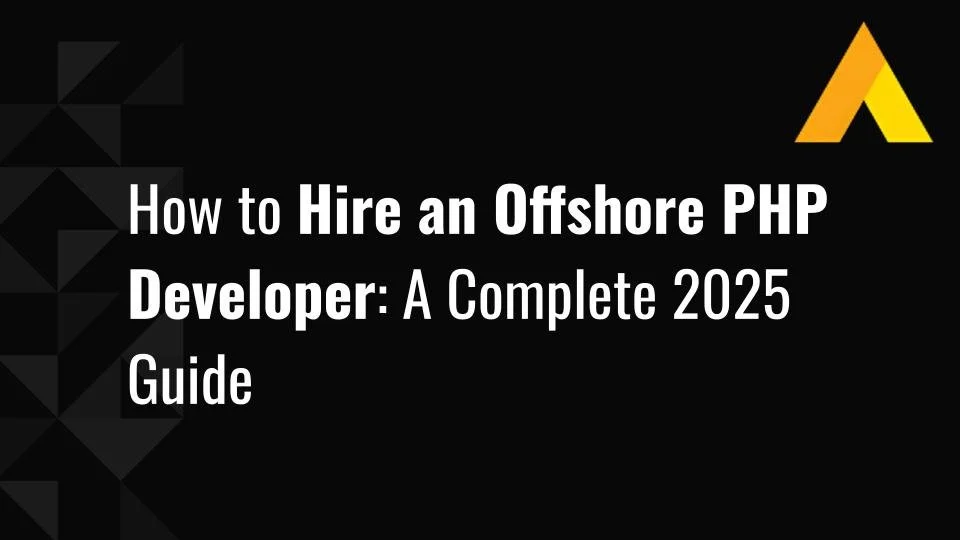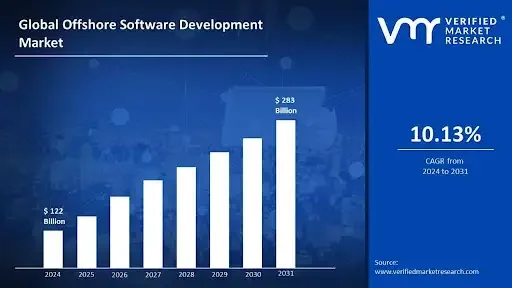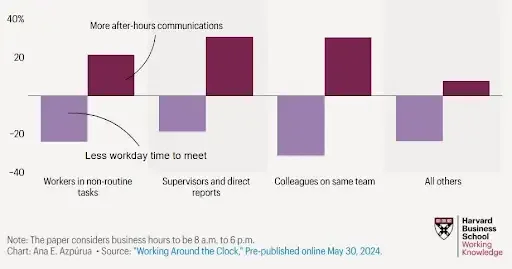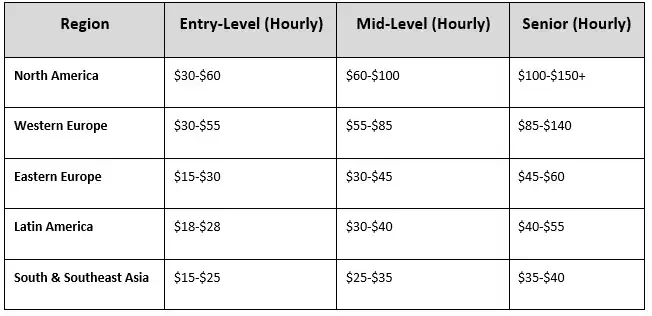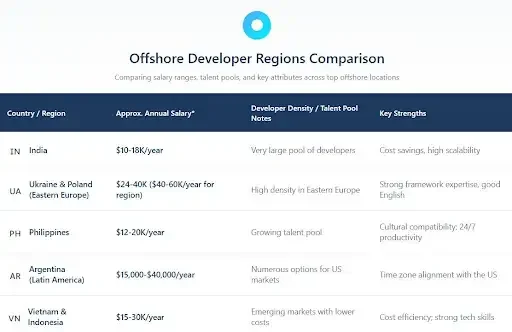How to Hire an Offshore PHP Developer: A Complete 2025 Guide
PHP still holds a large share of online systems: it now runs on 73% of web platforms that support SaaS products and long-running internal tools.
As demand is still high, local hiring gaps may force you to look beyond your region for stronger options.
Offshore teams can fill that gap because they give you faster access to senior talent, lower development costs, and the flexibility to scale without slowing delivery.
You’re on the right page to find the right talent for your team.
In this guide, you’ll see how to judge skills, compare regions, and run a clean hiring process that fits your setup. You’ll learn what to check, what to avoid, and how to pick the right partner.
To avoid hiring the wrong type of team (or paying for a service you didn’t intend to buy), let’s get clear on what offshore PHP talent actually means.
What Is an Offshore PHP Developer?
An offshore PHP developer is a PHP specialist based in another country who works remotely as part of your software development team. This setup gives you access to a wider global pool and lets you bring in skills that match your project needs without changing your internal structure.
Offshore, nearshore, and onshore models differ mainly by distance and overlap.
Offshore teams sit farthest from your region.
Nearshore teams sit closer.
Onshore teams sit in your own country.
Each model affects your hiring reach and your time zone differences, which then shape how daily work flows.
For context, the offshore model demand keeps growing. According to Verified Market Research, the offshore software development market reached $122 billion in 2024 and is projected to hit $283 billion by 2031.
Source: Verified Market Research
This growth reflects how fast companies move to remote talent to support backend logic, API integration, and CMS systems.
So with this base in place, let’s now move to why businesses rely on offshore PHP talent in the first place.
Why Businesses Hire Offshore PHP Developers
Businesses hire offshore PHP developers because this model gives you faster access to strong backend talent while keeping delivery predictable and cost-effective. This idea is echoed by several experts in various niches:
“The important thing about outsourcing or global sourcing is that it becomes a very powerful tool to leverage talent, improve productivity, and reduce work cycles.” - Azim Premji, Indian businessman and former chairperson of Wipro
Here are the main factors that drive this choice and how each one affects your delivery flow.
Cost Efficiency
Offshore teams cut costs, so you can reinvest your profits in product growth. In fact, many regions give you cost savings of 50-70% compared to local hiring. This matters because salaries, equipment, and workspace usually take the largest share of engineering budgets.
Countries like India, Eastern Europe, Latin America, and Southeast Asia offer a wide range of PHP developers. So, you can pick the level of experience you need without stressing your budget.
Pro tip: A simple comparison across these regions helps you see where senior talent fits your targets without slowing your roadmap. We'll cover that later in this article.
Access to Global Expertise
A wider talent pool lets you match skills with your tech stack instead of settling for people available in your city or investing more in mentorship. This reach includes developers trained in major PHP frameworks, as well as specialists for API development, WooCommerce builds, headless CMS setups, and more.
And you may even find engineers with a stronger cultural fit for long-term work.
24/7 Productivity
Offshore teams help you move faster by keeping work active even when your local team signs off. And here’s where it gets practical.
Studies on the “follow-the-sun” model show 10-22% faster delivery when teams in different time zones pass tasks through a clean workflow. That speed supports quicker rollouts and reduces long waits during testing or fixes.
Scalability and Flexibility
This model lets you scale a full-stack team up or down with minimal friction. The offshore model adapts easily whether you need to add a few developers to your existing team (staff augmentation) or bring in a full, long-term external engineering team (dedicated team). Project-based setups are also available if you only need short-term delivery.
And to put that into context, research from FullScale shows staff augmentation reaching 83% success with retention near 92-95%, while traditional outsourcing sits far lower. This difference matters when you want stable work and predictable output.
Focus on Core Work
As offshore developers take care of maintenance and routine backend tasks, your in-house team can focus on features tied to revenue, security, or platform growth. This shift frees time for roadmap work and improvements to your CI/CD pipelines.
With that context set, let’s continue with a closer look at how offshore and local PHP talent compare and when each choice makes sense.
Pro tip: Looking for help choosing the right partner to scale your engineering team? Check out this software engineer staffing agencies guide for a clear breakdown of the best options.
Offshore vs. Local PHP Developers
Choosing between offshore and local PHP talent affects how fast you scale, how you allocate budgets, and how well your delivery process stays aligned. To give you a clearer view, here are the main tradeoffs for each path and how they shape your work.
Pros and Cons for Hiring Offshore PHP Developers
Offshore hiring helps you widen your tech talent reach and balance cost with output quality. This route makes sense when your deadlines are tight, your local market lacks senior skills, or you need capacity without raising a fixed headcount.
Pros:
Access to broader skills for offshore PHP development.
Lower integration and long-term cost advantages.
Larger full-stack team options across regions.
Better time advantages for faster handoffs.
Flexibility when scaling up or down.
Cons:
More effort required for clear handover routines.
Differences in communication skills across countries.
Must validate security and legal and compliance steps early.
Also, you can check out this YouTube video to learn more benefits and drawbacks:
Pros and Cons for Hiring Local PHP Developers
Local teams fit best when you need tight collaboration for early product shaping or rapid iteration that depends on same-day involvement.
Pros:
Easier alignment with your software stack.
Shared work hours for fast feedback loops.
Fewer barriers during planning or sprint changes.
Closer access to product workshops or system mapping.
Cons:
Higher salaries and limited hiring reach.
Slower scaling due to smaller local markets.
Higher impact on budgets when growing a full-stack team.
Next, let’s move to what offshore PHP developers can actually handle for you on a daily basis.
What Services Do Offshore PHP Developers Offer?
Offshore PHP developers handle a wide range of backend and product-building tasks that support your web applications and help you keep delivery moving at a steady pace. These services give you more room to shape the workload around your roadmap instead of stretching your in-house team.
The core areas they cover are:
Custom web app development: End-to-end builds for custom web solutions.
Full-stack PHP + JavaScript: Frontend and backend development in one workflow.
CMS & eCommerce site creation: Implementation and tuning of CMS solutions and e-commerce platforms.
API and microservices development: Clean API design and scalable service layers.
Migration & modernization: Moving legacy code to PHP 8+ with stable patterns.
Maintenance and quality assurance: Testing, refactoring, and long-term support.
Each of these services helps you close delivery gaps without raising internal load. Now, let’s look at the technical skills that set strong offshore PHP talent apart.
Pro tip: Struggling to understand what actually works in today’s tech hiring world? Take a look at our IT and tech recruitment guide for a clear breakdown of modern best practices.
Key Technical Skills to Look For
Strong offshore PHP talent must bring the depth your roadmap needs. So, in this section, we'll show you the hard skills that your offshore PHP developer needs to have to keep delivery stable and predictable.
PHP 8+ and OOP patterns: Clean, maintainable logic for large web applications.
Framework experience: Laravel, Symfony, and others applied to real projects.
Database handling: MySQL, PostgreSQL, MongoDB, Redis, and strong SQL/MySQL databases work.
RESTful/GraphQL APIs: Solid API design and integration practice.
CI/CD pipelines, Docker, Git: Reliable automation and structured releases.
Security: OAuth2, JWT, and proper input handling.
CMS familiarity: WordPress, Drupal, and scalable CMS solutions.
Here are the soft skills that your offshore PHP developer needs to have:
Communication across time zones: Poor communication affects how your days flow. Unfortunately, research from a large multinational found that real-time communication drops for teams spread across regions. Use that insight to plan overlap rather than be taken by surprise.
Source: Harvard Business School
Proactive reporting and collaboration: Studies from Gallup show that strong collaboration can lift performance by up to 50%. If your PHP developer has this skill, it will support cleaner onboarding of offshore teams and smoother sprint cycles.
Problem-solving and adaptability: This is important for long-term stability when systems shift or specs change.
Moving on, let’s see the step-by-step process you’ll follow to hire the right offshore PHP talent.
How To Hire Offshore PHP Developers (Step-by-Step)
Hiring offshore PHP talent works best when each step supports the next. The process below gives you a clean path from scoping to onboarding. That way, you avoid delays and keep delivery stable.
Here's an interactive checklist to help you onboard offshore PHP developers with clarity and structure:
Step 1: Define Project Scope, Goals, And Tech Stack
Clear scoping sets the base for every decision. You must outline:
What the PHP developer will own
How it ties into your system architecture
What success looks like
This includes timelines, dependencies, and the custom web solutions or backend tasks you expect them to handle. A defined scope helps you filter candidates fast and avoid mismatched expectations later.
Step 2: Choose the Right Engagement Model
Next, decide whether you need a dedicated developer, an offshore development center, or project-based help. Each model fits different constraints:
Dedicated developers work well for long-term roadmaps.
ODCs help you scale when your team faces capacity problems.
Project-based hiring fits short initiatives where you need fast delivery without long commitments.
Step 3: Pick a Suitable Offshore Destination
Countries offer different strengths. For example, India gives you the widest talent pool, while Eastern European candidates bring strong engineering foundations.
Matching the region to your workload and backend requirements keeps delivery predictable, so we’ll discuss more regions below.
Step 4: Source Developers Through Multiple Channels
Your search can include direct outreach, LinkedIn, GitHub, or trusted hiring partners. This is where a structured process helps you move faster than local hiring cycles.
Strong sourcing also means looking at portfolios tied to website & app development, API work, and previous architecture responsibilities.
Step 5: Conduct Skill Assessments
Assessment needs to reflect real work. For example, coding tests show syntax skill, but live tasks show how the developer solves problems. Pair programming sessions reveal thought process. And practical tests around API in PHP, database management, or integration steps match them to your daily environment. This is where clear scoring rubrics matter.
Step 6: Verify References and Finalize Contracts
A quick reference check confirms how developers handle deadlines, code reviews, and changes in specs. Contracts should outline IP rights, delivery expectations, and security compliance standards. Because, as you may know, NDAs protect your data, your roadmap, and any strategic plans the developer may see.
Step 7: Onboard with Clear Workflows and Tools
A structured first week avoids setbacks. You must set communication rules, sprint schedules, review cycles, and handoff times.
Also, define how you’ll use Git for version control systems, your testing frameworks, and the tools used to manage environment changes or deployment stages. This gives the developer a strong start.
Step 8: How Alpha Apex Group Supports this Process
At this stage, Alpha Apex Group strengthens each part of your hiring flow. We act as a deep-vetting talent platform that screens technical skill, cultural fit, and remote-readiness.
Our team delivers candidate resumes within 72 hours and reaches full hires in about 43 days based on global averages. Also, we validate communication, run detailed interview questions, and handle identity checks for added security. After placement, we can support onboarding so your workflows stay consistent and your developer integrates smoothly.
Cost Of Hiring Offshore PHP Developers
Cost planning helps you decide which regions align with your budget, based on the level of experience and hours you need.
To make this easier, here's a table that outlines typical hourly rates across key regions, which you can use as a quick reference before you compare candidates.
Cost Variables
Several factors change the final cost of an offshore PHP developer, and each one ties back to the type of work you expect them to handle.
Project size, complexity, and framework: Larger builds with complex system designs or integrations require stronger engineering depth and higher rates.
Engagement duration: Short projects cost more per hour because onboarding time is the same, while longer engagements spread that load.
Quality assurance and post-launch maintenance: Testing cycles, bug fixes, and planned improvements increase total hours but help you reduce future maintenance downtime.
Total Cost Ownership Considerations
Hiring offshore PHP developers comes with several cost factors that shape your final budget. The size and complexity of your project, along with the framework involved, influence how many hours you will need and the level of engineering depth required.
Longer engagements usually bring steadier pricing because onboarding and setup time are spread over a wider period. You also need to factor in ongoing testing, quality checks, and post-launch support, since these reduce future maintenance downtime.
Apart from the hourly rate, real ownership costs appear in onboarding, project management tools, communication needs, and the long-term gains that come from lower turnover.
How to Manage Offshore PHP Teams Effectively
Managing an offshore PHP team works best when your structure supports continuous delivery. A clear workflow gives everyone the same expectations and keeps progress predictable even when schedules or locations differ. With that foundation, here are the areas that shape a stable working rhythm.
Communication Framework
Strong communication keeps tasks aligned and prevents blockers from spreading. Synchronous and asynchronous tools like Slack, Zoom, Jira, and GitHub give your team clear channels for updates, reviews, and handoffs.
Pro tip: We advise you to schedule a small overlap window each day. This keeps decisions moving instead of waiting for the next cycle.
Regular stand-ups and sprint reviews close the loop and help you keep scope, code quality, and progress in sync.
Project Management
A simple and consistent process helps you avoid friction. Agile methods create predictable cycles with built-in checkpoints, while sprint planning assigns ownership and defines what “done” means.
So, setting milestones early lets your team understand how their work fits into your roadmap. Also, version control, combined with a clear branching strategy, keeps changes organized and supports clean reviews and releases.
Quality Assurance & Testing
Reliable output comes from QA steps that mirror real product conditions. CI/CD pipelines automate repetitive work and keep releases consistent, while peer code reviews help catch issues before they escalate.
Automated testing tools like PHPUnit, Selenium, and SonarQube add another safety layer by reducing the chances of technical debt building up over time.
Security and Compliance
Remote teams may handle sensitive data, so protection starts at the contract stage. NDAs, GDPR guidelines, encryption standards, and clear IP rules help you keep ownership and compliance intact. This clarity removes risk early and keeps your team focused on delivery rather than policy questions.
Common Challenges and How to Overcome Them
Working with offshore PHP teams brings strong advantages, but it also introduces a few predictable hurdles that you can manage with the right structure. A clear plan helps you reduce delays, avoid misalignment, and keep output consistent across all contributors.
Here are the main issues you may face and the steps that help you resolve them early.
Language or cultural barriers: Onboarding sessions create shared expectations around communication style, decision-making, and escalation paths, which keeps collaboration steady.
Time zone misalignment: A small overlap window each day removes waiting cycles and helps both sides make decisions without slowing the sprint.
Quality inconsistency: According to a systematic mapping study, collaboration and coordination challenges appear in about 33% of global software projects. To create structure and stable workflows for distributed teams, you need to implement coding standards and review rules. Even automated QA tools can keep output predictable.
Hidden costs: Clear contracts, defined scopes, and transparent pricing remove surprise charges tied to changes, tooling, or extended testing needs.
Each of these challenges can be handled with early planning and consistent workflows that match your delivery pace.
Pro tip: Facing the toughest hiring roadblocks in your tech team right now? Read our IT recruitment challenges guide to see how top companies handle them.
Best Countries To Hire Offshore PHP Developers in 2025
Choosing the right region helps you match talent quality, time overlap, and cost structure with your product needs. Each market offers different strengths, so a clear comparison gives you a cleaner path to building a stable team.
So, here are the regions that stand out in 2025.
India: The broadest PHP talent pool with strong scalability and competitive pricing. And according to recent industry counts, the country has about 5.8 million developers, which explains why capacity remains high even for long-term or multi-module work.
Ukraine & Poland: Strong English skills and reliable experience across modern frameworks, especially for complex backend builds and architecture-heavy tasks.
Philippines: Strong cultural alignment and reliable communication patterns. This makes day-to-day collaboration smoother and supports late-cycle tasks that need fast responses.
Argentina: Better time zone alignment with US teams, which reduces delays in decisions and speeds up reviews or clarifications.
Vietnam & Indonesia: Fast-growing engineering markets with competitive costs and steady output for well-scoped PHP and API work.
How Alpha Apex Group Helps You Hire Offshore PHP Developers
Alpha Apex Group gives you a structured way to hire offshore PHP developers with a focus on accuracy, speed, and long-term stability. The process starts with global talent mapping and remote-ready screening.
This helps you filter candidates who already know how to work across different schedules, tools, and delivery demands. And this is reinforced by strict technical and cultural-fit evaluation that mirrors real project conditions.
At the core of our service is full-stack developer staffing, where front-end and back-end talent are sourced, vetted, and delivered based on your roadmap needs. Shortlists arrive within 72 hours, and the average time-to-hire sits at about 43 days, as we explained above.
This reduces the delays that slow product teams during critical cycles. Basically, you avoid long gaps in delivery and keep your engineering plans on track.
After placement, we stay engaged through integration support, performance monitoring, and retention guidance so your remote or distributed team remains stable. This ongoing involvement gives you a smoother path from hiring to long-term output and reduces the risks that come with offshore work.
Hire Your Next Offshore PHP Developer with Alpha Apex Group
Offshore PHP hiring has moved beyond being a basic cost choice. It now gives you a way to grow your product capacity and keep delivery moving without slowing your roadmap.
A steady approach helps you get the most value from it. That’s why many teams start small, test collaboration, and then expand once they see consistent output. And the real difference comes from alignment rather than location, since strong partnerships support cleaner code, faster cycles, and fewer setbacks over time.
If you want support with this process, you can contact Alpha Apex Group to build a reliable offshore PHP team with clarity and speed.

